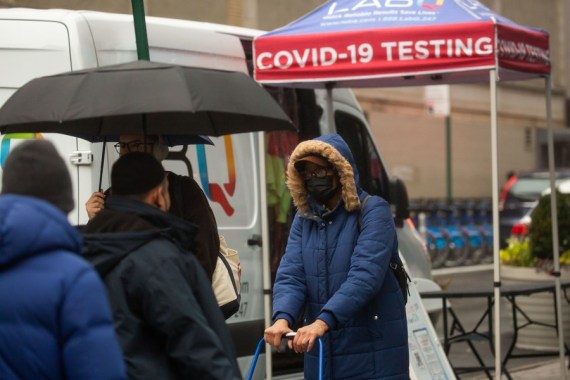XBB.1.5 strain of Omicron spreading fast in US
Published : 14 Jan 2023, 01:29
Updated : 14 Jan 2023, 01:31
Omicron new subvariant XBB.1.5 is spreading quickly in the United States during the third COVID-19 winter, straining U.S. hospital systems and causing staffing shortages, reported Xinhua.
XBB.1.5 is estimated to account for 43 percent of COVID-19 cases in the United States for the week ending Jan. 14, according to data released Friday by the U.S. Centers for Disease Control and Prevention (CDC).
XBB.1.5 is currently the most transmissible variant in the country. It made up 30.4 percent of the total cases in the week ending Jan. 7, rising from 20.1 percent from a week before and 11.8 percent from two weeks prior, according to the CDC.
The World Health Organization said earlier this week XBB.1.5 may spur more COVID-19 cases based on genetic characteristics and early growth rate estimates.
Public health officials are closely monitoring the spread of XBB.1.5, the most transmissible form of the coronavirus yet seen.
The mutations XBB.1.5 has acquired have made it more contagious. A more transmissible strain has the evolutionary advantage that it will spread faster than others, and therefore could displace other strains, according to health experts.
However, this new strain does not appear to cause more severe disease. Like other Omicron descendants, it probably causes milder illness compared with the Delta variants that predated Omicron.
There are some studies that suggest XBB.1.5 is more immune-evasive compared with previously dominant Omicron strains. Further research is underway to identify the degree of immune protection afforded by existing vaccines.
The rise in the new variant correlated with an uptick in COVID-19 cases in United States over the last six weeks.
Winter has traditionally been crunchtime for hospitals because of influenza and another seasonal pathogen, respiratory syncytial virus. Now SARS-CoV-2 has joined them to form an unholy trinity of pathogens that surge in the cold months.
With respiratory viruses across the country, hospitals nationwide are facing severe shortages of beds and staff to provide adequate care for patients.
White House COVID-19 response coordinator Ashish Jha said the American health-care system may not be able to withstand the continued viral onslaught, which strains the system's ability to care for other serious illnesses.
As the United States enters the third full COVID-19 winter, officials are warning the permanence of the coronavirus in the disease landscape could mean brutal and long-lasting seasonal surges of cold-weather illnesses for years to come, said a report of The Washington Post.
"I am worried that we are going to have, for years, our health system being pretty dysfunctional, not being able to take care of heart attack patients, not being able to take care of cancer patients, not being able to take care of the kid who's got appendicitis because we're going to be so overwhelmed with respiratory viruses for ... three or four months a year," Jha told the newspaper.


